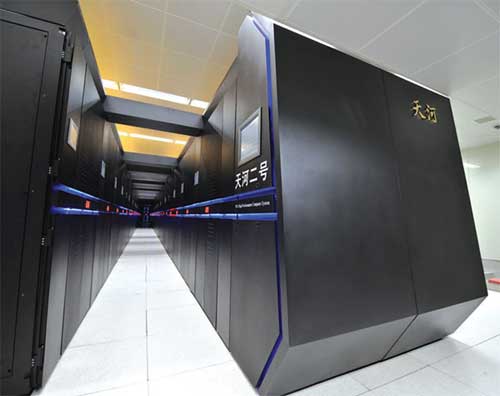 |
|
The Tianhe-2, a supercomputer developed by China's National University of Defense Technology, is named the world's top supercomputer for the fourth straight time by the TOP500. Xinhua |
As computer professionals from around the world met in New Orleans this week for the annual Supercomputing Conference, the Tianhe-2, a supercomputer developed by China's National University of Defense Technology, was named the world's top supercomputer for the fourth consecutive time by the TOP500 organization.
Based on a Linpack benchmark (a standardized test that measures computer performance), Tianhe-2 had 33.86 petaflops of computing power. A petaflop is a measure of a computer's processing speed and is equal to 1,000 teraflops, or one quadrillion floating-point operations per second. Tianhe-2 is nearly twice as fast as the next computer on the TOP500 list that was announced on Tuesday, Titan, with a performance of 17.59 petaflops. It belongs to the US Department of Energy (DOE) at the Oak Ridge National Laboratory in Tennessee.
"A supercomputer is a tool for scientists to solve some of our grandest challenges," said Nick Davis, spokesman for Cray Inc, a Seattle-based builder of supercomputers.
Supercomputers provide simulation for research into such immense issues as climate studies. "Supercomputers can recreate scientific phenomena in great detail," Don Johnston, spokesman for the Lawrence Livermore National Laboratory in Livermore, California, told China Daily. "How else can scientists create a lab to conduct research on potential solutions to reducing or eliminating air pollution? It would be too impractical or expensive to do it any other way."
Like everything else in computers, technology is constantly changing and advancing. Earlier this month, the DOE allocated $425 million for supercomputer research and development with $325 million awarded to International Business Machines Corp and Nvidia Corp to build supercomputers that are expected to be installed at the Oak Ridge and Livermore labs. Those next-generation machines will run at up to 150 petaflops.
The National Supercomputer Center in Guangzhou is making an update to increase the Tianhe system's speed to more than 100 petaflops, according to ShanghaiDaily.com.
Johnston said it's not really speed that everyone is pursuing; it's the ability to conduct multiple scientific and mathematical calculations in less time.
"A faster supercomputer means important research can be conducted in less time, which means a solution to a serious problem like air pollution can be discovered at a more rapid pace," he said.
Cray's Davis said supercomputers can be as small as one cabinet (about the size of a refrigerator). Large systems like Titan can use over 200 cabinets. The cost varies according to what the computer will be asked to perform. Johnston said the supercomputer delivered to Livermore in 2012 had a price tag of about $200 million.
Most supercomputers are housed at research labs and colleges. But private enterprise is gradually starting to learn that supercomputing can have bottom-line benefits.
"People see supercomputer capability as a measure of economic competitiveness. If I am developing prototypes for cars and planes, a supercomputer can probably help me find the ideal design in less time, which reduces costs," Johnston told China Daily.
"One of our clients is a major league baseball team," said Cray's Davis. "They are using the computer to consider the stadium, the opposing lineup, weather and a host of other factors in determining their selection of a pitcher."
paulwelitzkin@chinadailyusa.com
Guadalupe, a 55-year-old lady living in Spain, has been practicing tai chi for almost 20 years. She believes tai chi is not only a kind of martial art but a complete system of fusing traditional Chinese culture.

One of the potentially most traumatic things a girl has to go through is finding a new hairdresser.